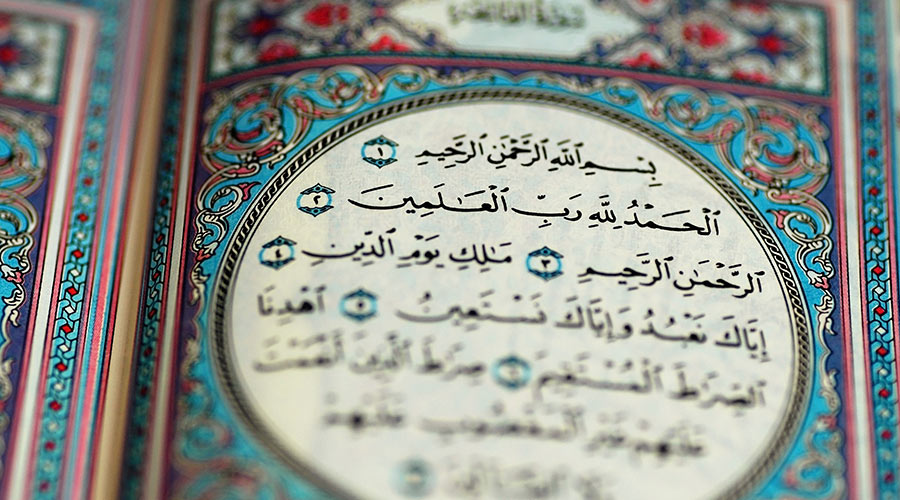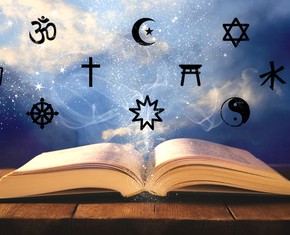The views expressed in our content reflect individual perspectives and do not represent the authoritative views of the Baha'i Faith.
Growing up as a Christian, many times I would hear this expression: “The Bible says.” Then the speaker would cite chapter and verse.
The listener would often respond: “Yes, but the Bible also says,” offering a counter-verse as proof of a contrary position. It’s as if the sacred text was arguing with itself!
Particularly interesting in all sacred texts—and problematic in most—are the prophecies about the Last Day, the Day of Judgment, etc. Why? Because they’re hard to figure out. They read easily, but they’re puzzling—true of the Bible, and true of the Qur’an.
So let’s now consider prophecies of the last days in the Qur’an. Yes, radical Islam is in the news each and every day. That’s a shame, really, because it tarnishes the good name of Islam.
But let’s think about traditional Islam, mainstream Islam, where the majority of Muslims are everyday people, like you and I, who want nothing more than to live in peace and prosperity, and who derive much inspiration and guidance from their Faith.
Probably most every Muslim (there are an estimated 2 billion Muslims in the world today) would agree that the Prophet Muhammad is the “Seal of the Prophets.”
This comes from a very important verse in the Qur’an: 33:40. Many regard this verse as the single most important verse in the Qur’an, doctrinally speaking.
With the possible exception of the Ahmadiyya (a new religious movement primarily centered in Pakistan), this means that Muslims consider Muhammad the last prophet. Period. Case closed. End of discussion.
Baha’is agree. Baha’u’llah, in fact, honors Muhammad in the following way, which goes somewhat above and beyond Qur’an 33:40:
Glorified art Thou, O Lord my God! I beseech Thee by Thy Chosen Ones, and by the Bearers of Thy Trust, and by Him Whom Thou hast ordained to be the Seal of Thy Prophets and of Thy Messengers, to let Thy remembrance be my companion, and Thy love my aim, and Thy face my goal, and Thy name my lamp, and Thy wish my desire, and Thy pleasure my delight. — Baha’u’llah, Baha’i Prayers, p. 74.
Now consider: Prophets prophesy. They foretell. According to Baha’i belief, Muhammad was the last of the Prophets, i.e. the last of those who prophesy. In other words, Muhammad was the last Prophet in the “Cycle of Prophecy,” which began with Adam.
Okay. Muhammad is the last Prophet. The last to prophesy. What comes next? Who comes next?
Prophecy ends when fulfillment begins. After the “Cycle of Prophecy” comes the “Cycle of Fulfillment.”
What does this mean, you ask?
It’s simple: Prophecies foretell the future. When prophecies come true, then they are fulfilled. Prophecy becomes fulfillment. That’s the way it works.
Around one-third of the Qur’an foretells the Last Day. The Last Day is a good example of what Baha’is mean by the “Cycle of Fulfillment.”
Even though prophets prophesy, their prophecies are not always clear, and often require interpretation. The first choice in interpreting any prophecy means asking this fundamental question: “Is this prophecy literal or figurative?”

So let’s take the very first prophecy after Qur’an 33:40. This occurs just four verses later at Qur’an 33:44:
On the day when they will be brought into the presence of their Lord, their greeting to each other will be, “Peace be with you.” God has prepared an honorable reward for them. – Qur’an 33:44, translated by Muhammad Sarwar.
Here’s another translation of the very same verse:
Their greeting, on the day when they shall meet Him, will be ’Peace!’ And He has prepared for them a generous wage. – Qur’an 33:44, translated by A.J. Arberry.
Arberry’s translation (“meet Him”) is literal. Sardar’s translation (“brought into the presence of their Lord”) is figurative. This is more in line with the Baha’i understanding.
Now let’s use our four-step key to understanding prophecy:
Step 1: If impossible, then not literal. Why is the literal reading not possible here? Here’s why: Because it is impossible to meet God directly, face-to-face. The Qur’an itself says so: “No mortal eyes can see Him, but He can see all eyes. He is All-kind and All-aware.” – Q. 6:103, translated by Muhammad Sarwar.
Step 2: If not literal, then figurative. What is the comparison or analogy expressed here? What compares to “meeting God”? Let’s agree on this: To “meet God” is literal. That’s impossible. What is possible is to be “brought into the presence of their Lord,” as Sarwar translates.
Step 3: If figurative, then symbolic. What qualities does this symbol represent? What does “meet God” symbolize? Whatever “presence of their Lord” means, it is surely an event in which the will of God is clearly communicated and made known. If we cannot meet God directly, then the next best thing is meeting God’s ambassador, God’s messenger, or what Baha’is call the “Manifestation of God,” who expresses “God” in nature, but not in essence.
Step 4: If symbolic, then spiritual and social. Who (or what) represents those qualities? According to the Baha’i teachings, when God sends humanity a messenger, that messenger comes from the presence of God and therefore represents God. Whoever has the bounty and blessings of meeting the messenger of God, in a figurative and symbolic way of understanding, has succeeded in “meeting God” by being “brought into the presence of their Lord.”
Think of the “presence of God” as divine charisma, an aura of holiness, the nimbus of the sacred, the halo effect. You may be surprised to know that “charisma” is actually a scientific term used in academia: sociologists of religion talk about the founders of the great world religions as having “charisma.”
I’ve tried my best to simplify the Baha’i understanding of these two key verses of the Qur’an which, in the larger picture, represent the two cycles: the Cycle of Prophecy, which is followed by the Cycle of Fulfillment. Baha’u’llah makes it clear in this important paragraph from his Book of Certitude, addressed to the Islamic world:
And yet, through the mystery of the former verse [Qur’an 33:40], they have turned away from the grace promised by the latter [Qur’an 33:44], despite the fact that “attainment unto the divine Presence” in the “Day of Resurrection” is explicitly stated in the Book. It hath been demonstrated and definitely established, through clear evidences, that by “Resurrection” is meant the rise of the Manifestation of God to proclaim His Cause, and by “attainment unto the divine Presence” is meant attainment unto the presence of His Beauty in the person of His Manifestation. For verily, “No vision taketh in Him, but He taketh in all vision.” [Qur’an 6:103.] Notwithstanding all these indubitable facts and lucid statements, they have foolishly clung to the term “seal,” and remained utterly deprived of the recognition of Him Who is the Revealer of both the Seal and the Beginning, in the day of His presence [Baha’u’llah]. – Baha’u’llah, The Book of Certitude, pp. 169-170. (Qur’an citations added in brackets).
You May Also Like
Comments

















Appreciate your articles immensely .... Rosslyn